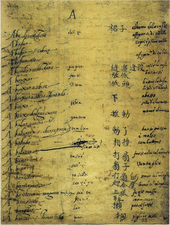Michele Ruggieri
| Chinese name | |
|---|---|
| Luo Mingjian | |
Hanyu Pinyin | Luó Míngjiān |
| Wade–Giles | Lo Ming-chien |
Michele Ruggieri, SJ (born Pompilio Ruggieri and known in
Life
Early life
Pompilio Ruggieri was born in
Missionary work

Ruggieri left Europe with a group of missionaries which included
Ruggieri was assigned to Macau to study the Chinese language and customs, arriving 20 July 1579.[2] He landed at the Portuguese trade centre and started at once to learn to read and write Chinese. In the process, and aware that several would be following him, he set up Shengma'erding Jingyuan ("St Martin House"), the first school for teaching Chinese to foreigners.
Ruggieri's and Ricci's intent was to settle somewhere in "real" China – not just Macao, and to that end Ruggieri made trips to Canton (Guangzhou) and Zhaoqing (the residence of the Governor General of Guangdong and Guangxi), making useful contacts with the local authorities. He is one of the first Christian missionaries to have entered
In 1584 Ruggieri published the first Chinese catechism.[2] Visiting villages in the region he baptized several families that formed the nucleus of further Christian communities in mainland China.
During 1583–88, Michele Ruggieri, with
Ruggieri was accused by Cai Yilong (
Return to Europe
In November 1588, Ruggieri left China for Rome in order to get the pope to send an embassy to the Wanli Emperor. This plan had been proposed as a means to allow Jesuits to reach Beijing and to be received by the emperor. But nothing became of it, the frequent death of Roman Pontiffs, and the deterioration of his own health, preceded the weary Jesuit's retirement to Salerno, where he died in 1607 without ever going to China again.[1][7]
In
References
Citations
- ^ a b c d (in French) Biography at the Ricci 21st Century Roundtable database.
- ^ a b c ""Michele Ruggieri", Biographical Dictionary of Chinese Christianity". Archived from the original on 2015-04-09. Retrieved 2015-04-04.
- ^ a b Yang, Paul Fu-Mien (2001). John W Witek (ed.). The Portuguese-Chinese Dictionary of Michele Ruggieri and Matteo Richi: An Historical and Linguistic Introduction. Ricci Institute for Chinese-Western Cultural History (University of San Francisco) and Biblioteca Nacional Portugal, Instituto Português do Oriente.
- ISBN 978-0-19-156167-2.
- ^ Yves Camus, "Jesuits’ Journeys in Chinese Studies" Archived 2015-09-24 at the Wayback Machine
- De Christiana expeditione apud Sinas suscepta ab Societate Jesu, Book Two, Chapter 12, "Father Ruggieri goes to Rome to arrange for an embassy from the Pope...". Pages 193–194 in the English translation: Louis J. Gallagher (1953). "China in the Sixteenth Century: The Journals of Matteo Ricci: 1583–1610", Random House, New York, 1953. The original Latin text can be found on Google Books.
Bibliography
- (in Chinese) Biography at the National Digital Library of China
- (in Chinese) About Ruggieri and Ricci at the Vatican Radio
Further reading
- DUNNE, G.: Generation of giants, Notre-Dame, 1962.
- GISONDI, F.A.: M.Ruggieri, Missionario in Cina e primo sinologo europeo, Milano, 1999.
- SHIH, Joseph: Le P.Ruggieri et le problème de l'évangélisation en Chine, Rome, 1964.
- RUGGIERI Michele: Atlante della Cina di Michele Ruggieri S.I., a cura di Eugenio Lo Sardo, Roma, Istituto poligrafico e Zecca dello Stato, 1993. ISBN 882400380X
- RUGGIERI Michele: La filosofía Moral de Confucio, Thierry Meynard & Roberto Villasante (ed.), Mensajero & Sal Terrae & Universidad Pontificia de Comillas, GC Loyola, Madrid, 2018. ISBN 9788427141896
- RUGGIERI Michele: Michele Ruggieri’s Tianzhu shilu (The True Record of the Lord of Heaven), Daniel Canaris (ed.), Leiden, Brill, 2023. ISBN 978-90-04-46934-1
